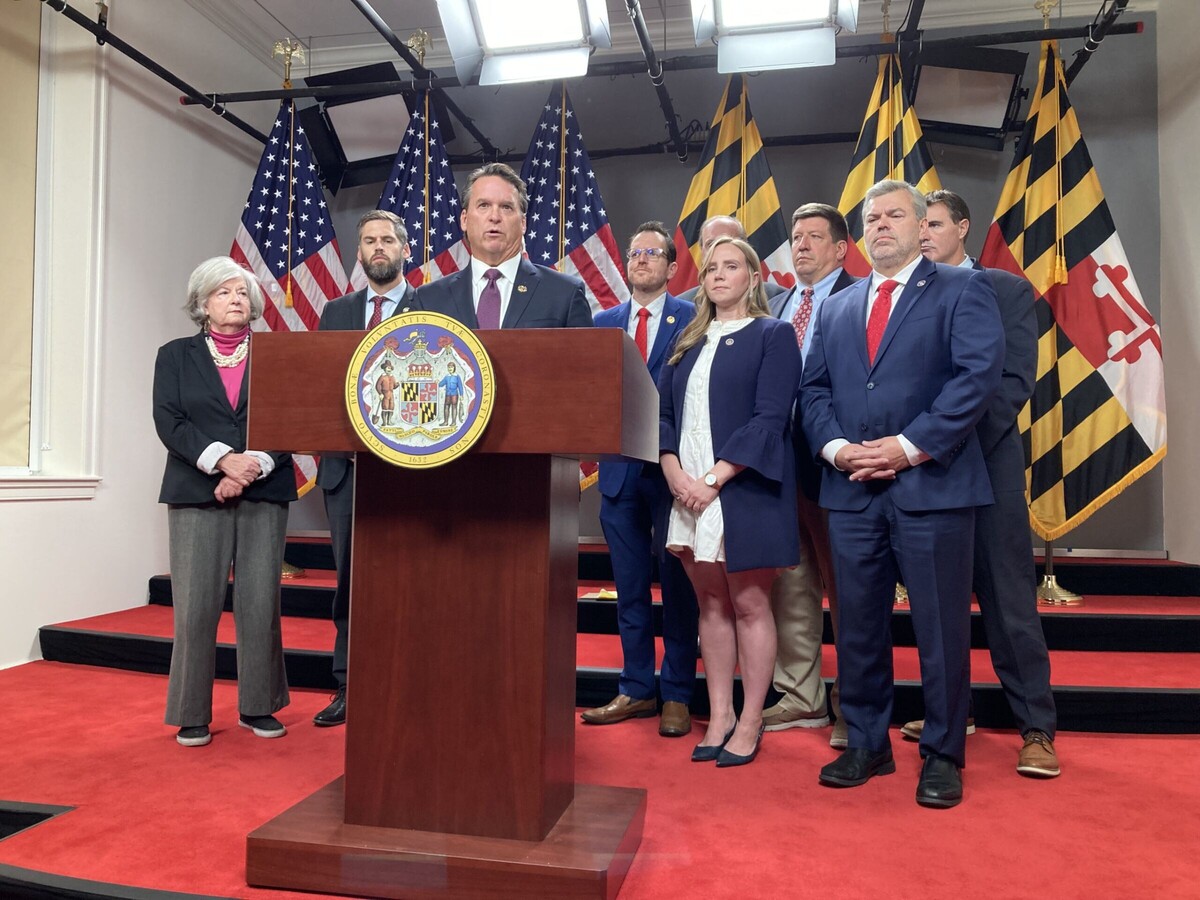Image


By Steph Quinn
Capital News Service
ANNAPOLIS, Md. — Republican state lawmakers vowed Nov. 14 to redress what House Minority Leader Jason Buckel, R-Allegany, called Maryland’s “soft on crime policies,” rolling out a 2024 public safety agenda that would reverse juvenile justice reforms passed by the General Assembly last year.
“The crime we’re seeing in our communities is not anecdotal, nor media manufactured,” said Senate Minority Leader Stephen Hershey, R-Kent, Queen Anne’s, Cecil and Caroline. “It is real. The violence is real. And we are pleading with our Democrat colleagues to join us in making it their priority as well.”
The package includes some previous proposals as well as new ones: It would increase penalties for gun theft and violent firearms offenses, authorize law enforcement to search vehicles based on the smell of cannabis alone and limit eligibility for bail or reduced sentences for those charged with or convicted of violent crimes.
One proposal would make theft of a firearm a felony, a measure Republicans have sponsored without success since 2018. Another would increase prison time and maximum fines for crimes committed with illegal firearms and would remove the “drug dealer loophole” whereby drug dealers receive a lighter sentence for possessing weapons than others committing similarly weighted offenses.
Revisiting reduced time for good behavior
A measure would eliminate reduced prison time for good behavior for those convicted of first or second degree murder, cap such reductions for other crimes of violence and prohibit bail for those accused of a crime of violence while facing pending violent crime charges.
Republicans said they seek to aid law enforcement in taking more illegal guns off the street by again authorizing officers to stop and search vehicles due to the smell of cannabis alone.
In Maryland's Democratic-controlled House and Senate, it is unclear how the Republican-backed public safety proposals would advance. Democratic state lawmakers could not be reached to comment on the chances of those proposals clearing both chambers.
The majority of states now have expanded alternatives to jail and prison to reduce the number of children behind bars, according to data by the American Civil Liberties Union. Maryland's youth incarceration rate is 151 per 100,000, a slightly lower rate than that of neighboring Delaware, Pennsylvania and Virginia, the ACLU found.
The youth justice proposal rolled out by the Joint Republican Caucus would require youth under 13 to appear before a juvenile court upon arrest for crimes involving firearms and broaden the juvenile court’s jurisdiction to include youth on their third arrest for nonviolent crimes, including auto thefts. It would also allow police to interrogate youth with parental consent alone, rather than requiring that a young person first consult with an attorney.
Diversion program under scrutiny
The proposal would allow law enforcement to skirt the Child in Need of Supervision (CINS) process, which can keep certain young people out of the juvenile justice system and instead connect them with community services. In Prince George's County, the CINS diversion program may also include an eight-week program for both parents and youth.
Del. Jesse Pippy, R-Frederick, said current law, including the CINS process, has neither held “offenders that happen to be juveniles” accountable nor connected them with services.
“The argument we’re hearing from on the street is (that) law enforcement doesn’t know what to do with these kids,” Pippy said. “So they’re not going anywhere. They’re not getting any services. No one’s talking with them. No one’s following up with them.”
The state's juvenile services data show that most CINS cases end in referrals to services rather than in court, but also that law enforcement are using the process infrequently in much of the state.
Though Pippy said he’s open to programs to educate police officers on the CINS process, which dates to 1969 in Maryland law, he and others said that CINS is not sufficient. Buckel said youth involved in escalating and violent crimes “need more than what the… Child In Need of Supervision system can provide.”
Juvenile facilities `not draconian'
Pointing to closures of residential facilities in western Maryland, Buckel suggested committed placement in Department of Juvenile Services residential facilities could give youth “opportunities to succeed.”
“They’re not draconian prisons,” he said. “They’re getting classes. They’re getting education.”
But advocates of youth legal reform have pointed to research showing that youth incarceration increases the likelihood of recidivism and have called for long-term investment in resource-starved communities.
Senate Minority Whip Justin Ready, R-Frederick and Carroll, stressed a need for balance in comments after the press conference, saying, “I think we need to provide more accountability and more services that are truly effective.”
Youth justice on conference agenda
“Keep kids out by strengthening local communities, finding out which neighborhoods are the most blighted, have the least resources, (are) the most impoverished,” said Nick Moroney, director of the Juvenile Justice Monitoring Unit in the state Office of the Attorney General, during the House Judiciary Committee’s hearing on youth justice Nov. 8.
The topic of juvenile diversion programs will be discussed at the Maryland Association of Counties winter conference in Cambridge Dec. 6-8.